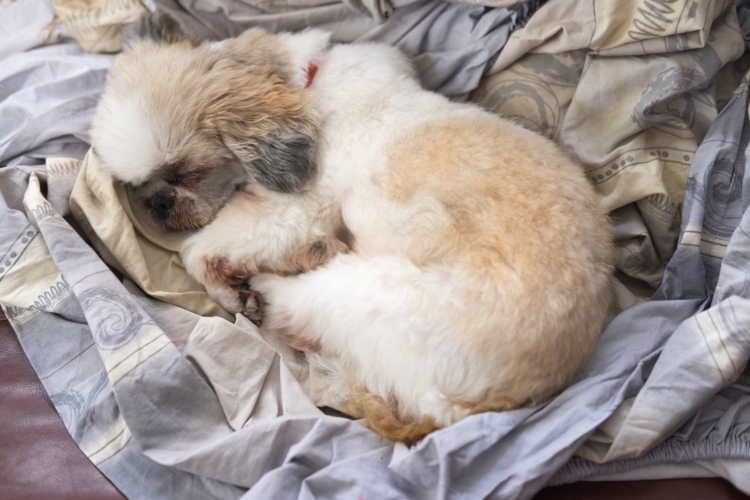- Home
- Shih Tzu Information
- dog sleeping a lot
Why Do Dogs Sleep So Much?
BY MOLLY | EVERYTHINGSHIHTZU.COM | OCTOBER 18, 2022
This post may contain affiliate links. Read privacy & disclosure policy for info
Dogs spend about one-third of their lives sleeping. Yes, that’s right. Your loyal friend spends roughly 30% of his or her life asleep.
That means you will spend nearly 300 nights a year in your canine pal’s company!

Dogs have evolved as a species to be primarily nocturnal, which means they are typically active at night and sleep during the day.
This is due to the fact that their owner needed to be out hunting for food at night, and the animals needed to sleep so they could stay rested for the next day’s hunt.
As we know from human culture, it is easier for people to sleep when there are fewer lights that can keep them awake; this is why dogs tend to wake up when everyone else does in order to get some extra shut-eye before going back outside again later on in the day.
Because of this nocturnal nature, many dog owners believe that having your pet sleep so much helps keep them sane and healthy since they aren’t exposing them to bright artificial lighting 24/7 (or even more so than this).
Others think it has a negative effect on dogs because they don’t get enough exercise and stimulation by keeping them inside all of the time.
The truth is somewhere in between.
Why Do Dogs Need So Much Sleep?
You know how it is; you drag yourself out of bed after slapping your alarm clock, start getting ready for work or other activities, make breakfast, maybe even do a few chores, and your sweet Shih Tzu is still snoozing away on your bed.
Sound familiar?
You might even have to wake up your dog to bring them outside for their morning potty break.
Of course, your dog can just as likely be the one to wake you up, eagerly bouncing around and ready to start the day.
Either one of these scenarios is perfectly normal because dogs sleep when their bodies tell them to sleep. Conversely, they want to play when their bodies tell them to play; they don't pay attention to the clock on the wall.
According to the National Sleep Foundation, dogs require a lot more sleep than humans, snoozing for about 50% of the day.
If you have a puppy, they likely need more rest and could spend about 18 to 20 hours of their day sawing logs. This is understandable for your Shih Tzu puppy; they're still growing and developing, very much like human babies, and toddlers need a lot more sleep than adults.
But what about healthy adult dogs? Why do dogs sleep for 12 to 14 hours a day?
Well, here's the thing, your dog would most likely prefer to go for a walk or play with you. You're your furry friend's whole world!
But, if your dog doesn't have anything else to do, then the odds are good they'll just take a nap or rest.
It makes sense when you think about it.
What would you end up doing if you had nowhere to go, no one to see, and nothing to do? You'd probably stretch out on the couch and drift off to sleep for a bit.
Therefore, if you'd rather your dog show some more pep, provide them with some stimulating activities or toys, initiate a play session, or go for a pleasant walk together.
Your dog would definitely rather play with you more than sleep, so it's all about providing the right opportunities and activities.
Is Your Dog Really Sleeping?
Another thing to keep in mind is during the day, when your dog is "sleeping," they most likely can pop back to a wakeful state at a moment's notice. This is because your pal is most likely just "resting their eyes" while still relatively in tune with what is happening around them.
Even if your dog isn't a watchdog or guard dog per se, they're still on alert, ensuring everything is as it should be.
You can likely tell when your dog is snoozing and when they are really konked out and fast asleep.
Generally, when your dog is resting during the day, they're dozing and can jump up when needed.
Toward the end of the day, your pup might need some time to unwind before going to bed (very much like people do), so it might appear that they're sleeping a lot earlier than they are.
When Should You Be Concerned About Your Dog's Increased Sleeping?
If your dog's sleeping a lot, but otherwise, everything else seems the same, then you likely have no reason for concern.
For example, if your dog is snoring one second but wide awake and ready to play as soon as you squeak their favorite toy, or your dog still shows interest in the things that typically excite them, then their sleeping habits are perfectly normal.
However, it's when your pup's sleeping habits start to change that you should raise an eyebrow and pay closer attention.
If the squeaking toy doesn't excite your pooch like it once did, or your dog stops responding to you, there could be other issues at play. Likewise, if you notice other signs like loss of appetite, weakness, or other out-of-the-ordinary behavior, these should send up a red flag.
Anytime you start to notice a shift in your pup's sleeping habits, or they seem excessively tired, it's best to schedule a visit with your vet.
Possible Reasons for Increased Sleeping in Dogs
Of course, as your dog enters their senior years, you'll likely notice they sleep more.
Older dogs, just like older humans, tend to tire out faster and need more rest.
But, as long as your pup is otherwise behaving normally, eating well, and not showing signs of distress, this slight increase in sleep is probably a normal part of the golden years.
Also, as mentioned above, if your pup is experiencing increased boredom or stress, this might cause them to sleep more.
You can combat this by providing your dog with stimulating activities like interactive toys, treat puzzles, and offering more times for exercise and play.
A lick mat can also help with stress since licking releases endorphins which can help calm your dog.
These mats are super easy to use. You simply spread a soft food or snack, like peanut butter or pumpkin puree, onto the mat and let your dog go to town.
Beyond your pup's age and boredom levels, here are some other possible causes for why your dog might be sleeping more than usual:
- Hypothyroidism
Certain breeds are more prone to hypothyroidism than others, as are older dogs.
It's when the dog has a decreased amount of the hormone called thyroxine which controls metabolism, helping convert their food into energy.
Luckily, the condition isn't life-threatening, so you can seek treatment from your vet to help your dog feel better fast.
- Diabetes
Canine diabetes can cause your dog to feel tired, but with proper care and management, you can help your pup live a happy life.
- Ingesting Something Toxic
If your dog suddenly seems very sluggish, it's possible they ate something toxic.
It's imperative to get your dog medical attention right away, as the sooner you seek treatment, the more likely your dog's chance of survival.
- Bacterial and Viral infections
Various infections can also cause your dog to be more tired than usual.
Some of these infections are preventable using vaccines, like kennel cough and parvo, while others could be similar to when you catch a stomach bug.
If you suspect an infection is to blame for your dog's increased sleep, seek veterinary care as soon as possible for possible treatments or medications.
- Anemia
A variety of things can cause anemia in dogs, specifically various parasites like roundworms, tapeworms, etc.
Anemia reduces the red blood cells and can lead to feelings of lethargy.

Ultimately, knowing your dog's usual sleeping habits is the best way to know if something else might be going on that you need to address.
- Home
- Shih Tzu Information
- dog sleeping a lot



